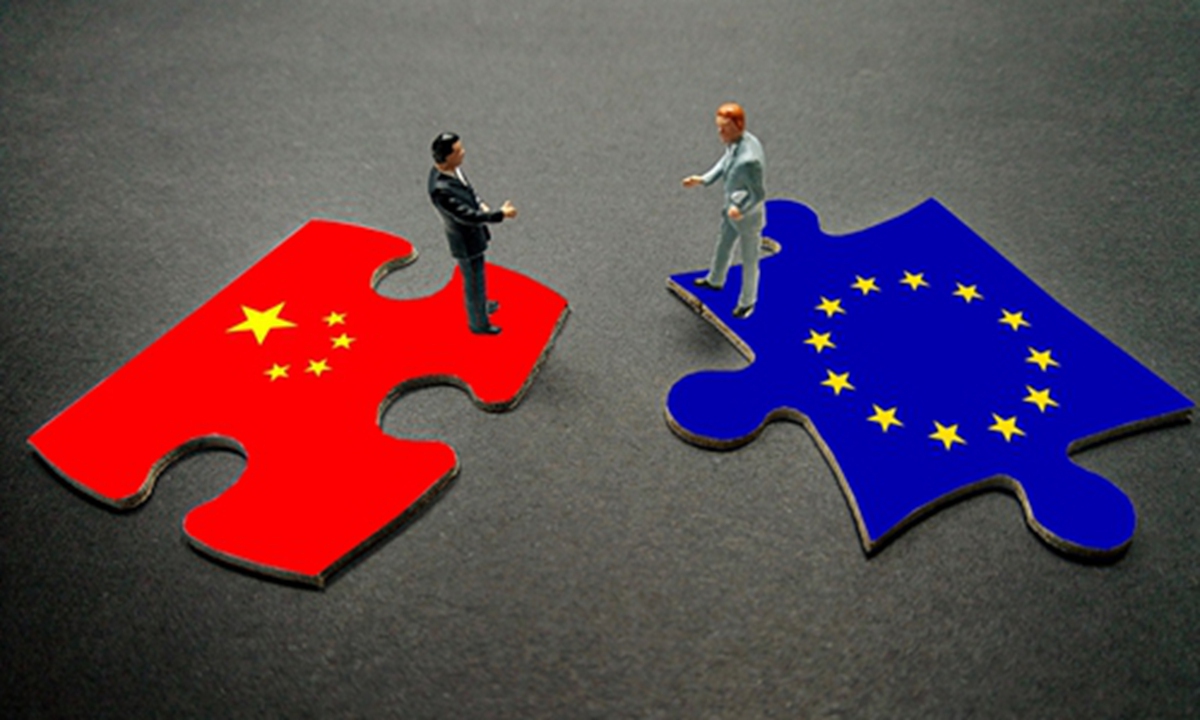While Chinese Vice President Han Zheng is visiting Portugal and the Netherlands from Sunday to May 12, China on Monday announced the visit of State Councilor and Foreign Minister Qin Gang to Germany, France and Norway from Monday to May 12. The ongoing visits showed China and the EU are embracing a full resumption of exchanges with frequent high-level interactions and people-to-people exchanges, analysts said.
With active interactions between China and the EU taking place since the end of last year, observers hope that the EU will have a more objective perception of China, especially amid the debate on China policy, in order to filter out the noise from the US and untangle the knot of the Ukraine crisis.
On Monday, Chinese Foreign Ministry spokesperson Wang Wenbin announced Qin’s visit and said that during his visit to France, he will exchange views with the French side on implementing the consensus reached by their heads of state, improving cooperation in all fields and promoting the China-France comprehensive strategic partnership to a higher level.
While visiting Germany, Qin will strengthen communication with the German side to promote the stable and healthy development of bilateral relations, Wang said, explaining that as China and Norway prepare to welcome the 70th anniversary of establishment of diplomatic relations, via Qin’s visit, China is expected to further consolidate mutual trust and promote bilateral relations to a new level in the new era.
China’s Vice President Han Zheng is also visiting Portugal and the Netherlands from May 7 to May 12 after attending the coronation ceremony of King Charles III of the United Kingdom on May 6.
While the US clamors about decoupling with China, it is of great significance and value for China and Europe to further promote bilateral relations through friendly interactions, which will also inject stability and positive impetus into the world, Gao Jian, a scholar at Shanghai International Studies University, told the Global Times.
The recent close interactions between China and Europe reflect the resumption of exchanges between China and the world after three years of the pandemic. They also highlight the great importance China and the EU have attached to each other, as both sides have been active in maintaining high-level and high-frequency exchanges and dialogues in stabilizing the global situation and promoting economic recovery, Cui Hongjian, director of the Department of European Studies at the China Institute of International Studies, told the Global Times on Monday.
One of Qin’s focuses during the visit will be to implement the consensus reached by the top leaders during their meetings, analysts said. Chinese President Xi Jinping met with German Chancellor Olaf Scholz on his official visit to China in November 2022 and received French President Emmanuel Macron in April in China’s Beijing and Guangzhou.
From the end of last year to the beginning of this year, China and the EU relations are experiencing “a comprehensive restart”, with dialogues and exchanges in various fields being promoted. Qin’s visit will smooth communication in the fields of diplomacy, security strategy and so on, said Cui.
The expert noted that the current close China-EU interactions also offer an opportunity to help Europe gain a more objective and clear perception on China, at a time when the EU is in the midst of a heated discussion on policies toward China, while misinformation and biased views are mounting. “A comprehensive and objective view on China is the basis for making policy that is beneficial to both China and the EU,” said Cui.
Europe has been in a debate over its relations with China. While some European officials criticized Macron’s remarks during his visit to the country in April and urged the EU to adopt much tougher rhetoric toward China-related topics, some EU politicians, including Macron himself, called for strategic autonomy of the bloc and not to become a “vassal” of the US on the Taiwan question, which China considers its core interest.
Observers said that various views on China within the EU are set to complicate factors. Aside from the US influence, some countries in the EU call for dialogue with China in some fields while in other fields, they stressed competition with the country. To the EU, it wants to maintain balance in economic and political relations with China.
Not an obstacle
The Ukraine crisis will also be an important topic during the visits of senior Chinese officials to Europe, as it is a geopolitical event that has affected global security governance and the global situation, analysts said. However, some EU and American politicians and media are attempting to make the Ukraine crisis one of the prerequisites for the development of China-EU relations and to make it a knot in China-EU ties.
On Monday, the Financial Times reported that the EU has proposed sanctions on Chinese companies for “supporting” Russia for the first time since the conflict in Ukraine began. The report said that the move is likely to increase tensions with Beijing.
Chinese Foreign Ministry spokesperson Wang Wenbin said on Monday that China firmly opposes long-arm jurisdiction or illegal sanctions on Chinese companies over China-Russia cooperation. China upholds an objective and fair stance, actively promotes peace talks, and has played a constructive role in facilitating a political settlement of the crisis.
If the relevant reports are true, the EU’s actions will seriously damage the mutual trust and cooperation between China and the EU, and aggravate division and confrontation in the world, which is extremely dangerous, said Wang, urging the European side not to take the wrong path.
Gao from the Shanghai International Studies University, said that China’s willingness to promote peace talks should not be viewed fairly, as it is neither the creator nor a party to the Ukraine crisis. The US is the creator of the crisis, and is having a negative influence on the EU.
The Ukraine issue should not be an obstacle to China-EU communication, but an opportunity for both sides to strengthen coordination, observers said.
China has taken steps in working with the European side to promote peace and dialogue and during the top leaders’ meetings, the two sides have reached consensus on opposing nuclear war, jointly preventing humanitarian crisis and preventing any spillover effect, said Cui, noting that Qin’s visit may promote pragmatic cooperation in these fields.













